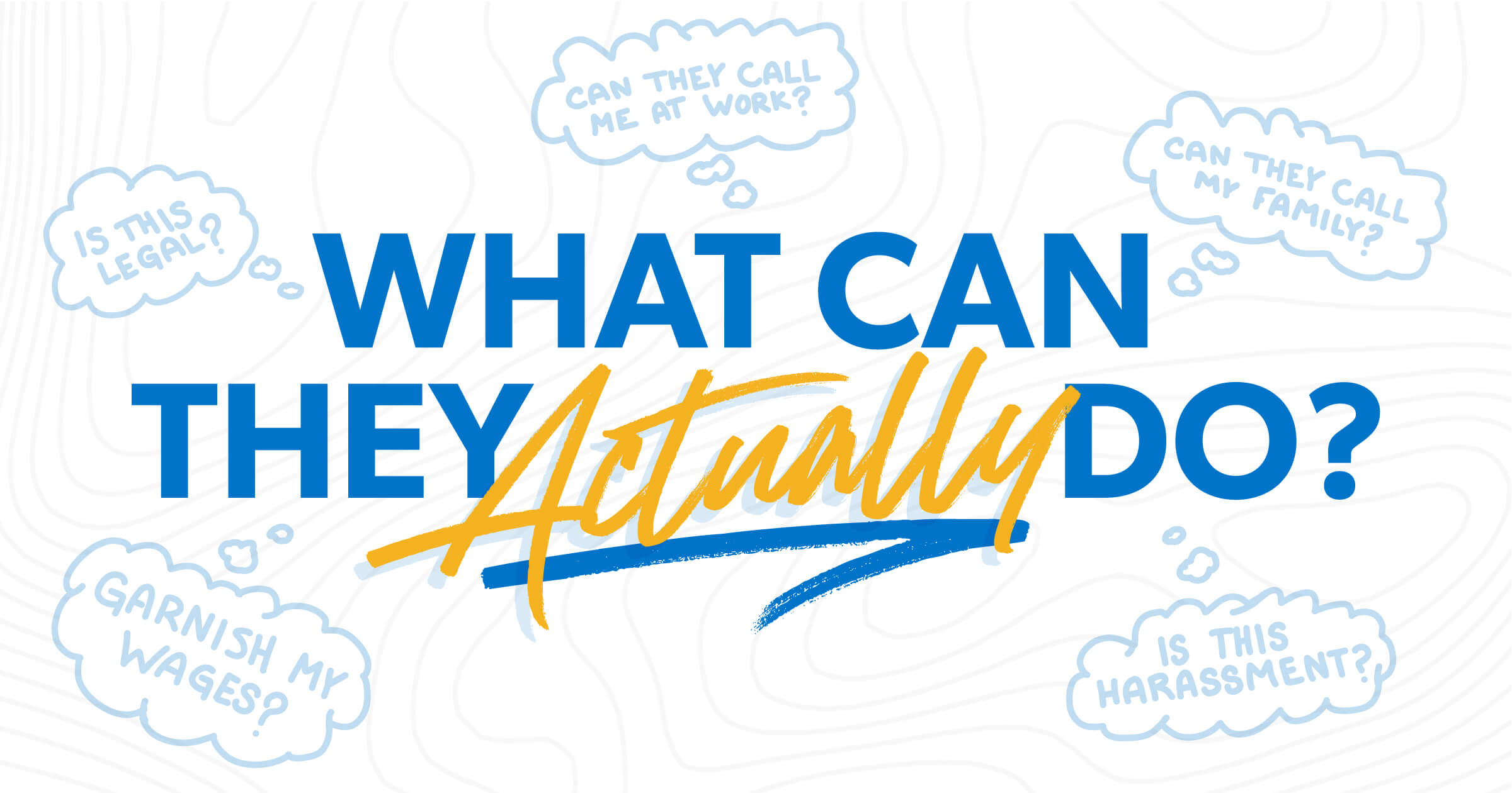Don’t Believe the Lies: What Can Debt Collectors Do?
7 Min Read | Oct 20, 2023

There’s a specific kind of dread that happens when you get a call from a number you don’t recognize, but you know who it is. It comes with that sick feeling in the pit of your stomach combined with a mixture of fear, shame, anxiety, and probably even a hefty dose of anger or annoyance. That’s right—it’s a debt collector calling again. Besides annoying the heck out of you and interrupting dinner, what can debt collectors do? And at what point does annoying turn into harassing?
Debt collectors and collection agencies aren’t known for their glowing reputations. It’s a safe bet that they’re more disliked than Congress and Nickelback combined. And with around 70 million people with bills in collections, that’s a whole lotta unhappy folks.1 Debt collection tactics, which are supposed to follow guidelines set under the Fair Debt Collections Practices Act (FDCPA), are shady and overwhelming at best and manipulative and illegal at worst.
But you don’t have to fall prey to their schemes. Today, what debt collectors can do to secure payment is a lot more limited than it used to be. So before you pony up a cent, make sure you understand what debt collectors can do.
Are Debt Collectors Legal?
It’s a tale as old as time. No, we’re not talking about true love conquers all. We’re talking about debt collectors doing what debt collectors do best—be jerks. But being a jerk isn’t illegal—and being a debt collector isn’t either.
Debt collectors are not the same as creditors. It’s typically creditors, like hospitals, credit card companies, mortgage lenders and others, who sell your debt to third-party collection agencies. These agencies buy your debt for pennies on the dollar, turning a profit on the funds they’re able to collect from you. And they have a legal right to do all of this.
So whether it’s a six-figure medical bill from an emergency surgery or because you bought a car you couldn’t afford, a debt collector can hound you for payment. What isn’t legal are some of the tactics some debt collectors still try to get away with, like harassment and threats.
Can Debt Collectors Call Your Work?
Receiving a debt collection call at work can be downright humiliating. It feels like a line has been crossed where your private life is drawn into your professional life. And that’s the point: to find you, make you feel vulnerable, and shame you into action. Unfortunately, what they’re doing is not illegal. But you have rights here.
What You Need to Know About Debt Collection and Your Job
Debt collectors can’t just do whatever they want. And your hands aren’t tied. Here’s what you need to know when it comes to debt collection and your job.
- Debt collectors cannot come to your place of work. It’s illegal.
- The FDCPA prohibits debt collectors from publicizing your debts. That means they can’t call your boss and say you’re $11,000 upside down on your car and haven’t made a payment in months.
- They can call you at work, but they can’t identify themselves as a debt collector to the person answering the phone.
- You can ask them not to call you at work, and by law, they have to stop.
Can Debt Collectors Contact Your Family?
Debt collectors are ruthless. While they can call family members to track you down and attempt to embarrass you, they can’t reveal why they’re calling. And in general, debt collectors can only call a family member once. If they call repeatedly or discuss the details of your debt, they’re violating the law. You can report them to your state’s attorney general or submit a complaint to the Consumer Financial Protection Bureau (CFPB).
Get help with your money questions. Talk to a Financial Coach today!
Debt collectors can, however, contact a small group of people and legally discuss your debt:
- Spouse
- Parent (if a minor is the one carrying the debt)
- Guardian or executor
- Attorney (if they’re representing you in a debt-related matter)
Of course, the most straightforward way to get a debt collector to stop calling your family is to pay the debt. But in many cases, it’s not that simple—especially if you believe the debt is inaccurate or fraudulent.
Can Debt Collectors Refuse a Payment Plan?
The short answer is yes. A debt collector is not required to negotiate with you. You may want a payment plan or to whittle your debt down through negotiation, but that doesn’t mean it’s going to happen. Keep in mind that collection agencies are on the hunt to get as much money as fast as they can. So long, drawn-out payment plans or massive debt reductions might be a long shot.
But a lot of these operations come from a place where something is better than nothing, so you can—and should—fight for yourself. (More on how we can help with that in just a minute.) Before you start any negotiation attempt though, make sure you have in writing what they say you owe. If this is inaccurate, then you need to first take steps to get an accurate accounting of your debt.
If the numbers are correct though, then your first job is to pay off as much of the debt as you possibly can. A debt paid is a mind set free. But if your debt is too large, then it’s a good time to negotiate for a payment plan or to request the debt be settled. In the case of settlement, you may be able to get your debt cut by 50% or more.
Can Debt Collectors Garnish My Wages?
A debt collector can’t directly dip their hands into your paycheck, but they’ll have no problem suing you for what you owe. If the judge rules in their favor, the debt collector has every right to go after wages and assets.
Plus, if you’re sued and fail to show up in court, don’t be surprised if you lose by default and are court-ordered to pay back what you owe. Defy the court order, and a debt collector or agency can pursue an arrest warrant.
What Is Considered Debt Collector Harassment?
Once you’re on a debt collector’s radar, it can become a full-time job trying to dodge them. Yes, debt collectors have a right to their money. But they don’t have a right to harass you or your family, garnish your wages, arrest you, threaten you, or break the law in any way to get what they’re due.
Are debt collectors relentless and obnoxious? 100%. But when does a line get crossed between doing their job and straight-up harassment?
If a debt collector does any of the following, you should report them to your state’s attorney general office or the CFPB:
- Calls you before 8 a.m. or after 9 p.m. in your time zone
- Makes repeated daily calls
- Sends multiple letters
- Threatens legal action repeatedly
- Uses abusive or obscene language
- Publicizes information about you or your debt
- And starting in late 2021, debt collectors will also be able to contact you via text, email and social media, so look out for abusive or harassing outreach attempts there too.2
You can also request debt collectors stop calling or writing you, and by law, they have to comply with your request. But remember, out of sight, out of mind is not a winning mindset. The debt you owe needs to be addressed, and the absence of annoying phone calls or endless letters in the mailbox doesn’t make the debt disappear.
Protect Yourself and Move Forward
Getting into debt didn’t happen overnight, and neither will getting out of it. But there’s good news: You don’t have to slog through this work alone. With help from a Ramsey Preferred Coach (RPC), you’ll finally be able to see a light at the end of the tunnel. Your RPC will walk with you, cheer you on, and help you find hope—even when you’ve got debt collectors to deal with. Book your complementary session with an RPC today.
Don't Go It Alone: Connect With a Financial Coach
A trained financial coach helps you navigate your money problems and make real money progress.



